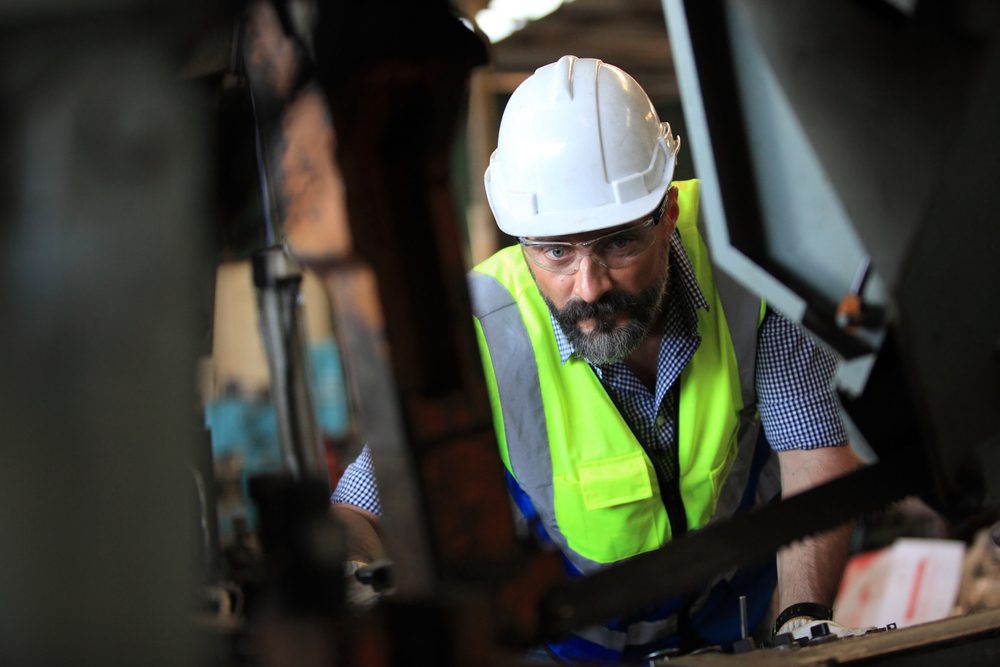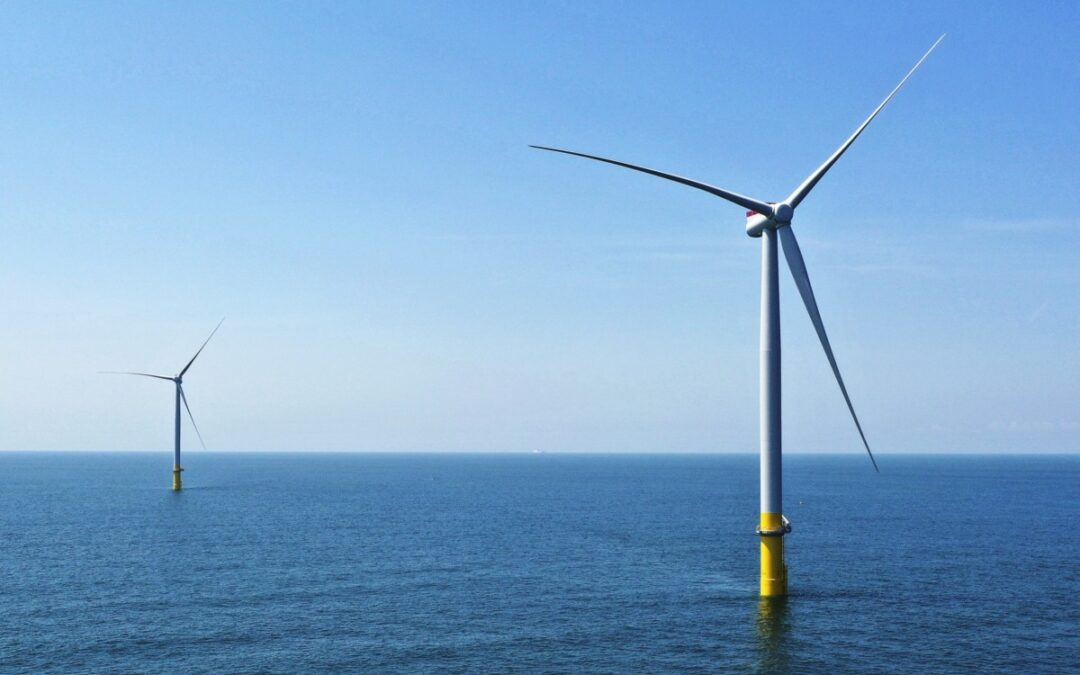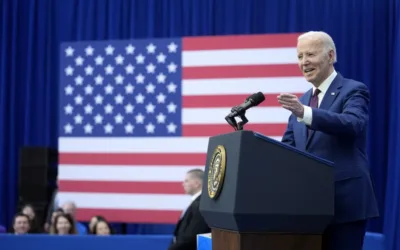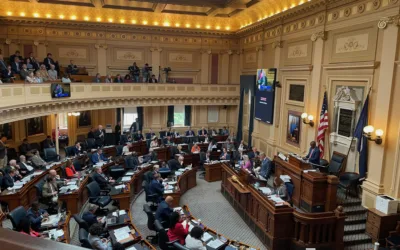
Graphic by Francesca Daly
In 2021, President Biden signed the historic $1 trillion infrastructure bill into law, delivering on a key piece of his economic agenda. Since then, billions of dollars have been funneled into all 50 states in order to upgrade highways, transit systems, water systems, and more.
In Virginia, $4.4 billion in funding has been announced so far, and more is on the way. Here’s a look at the work that’s being done in the Old Dominion and how it helps Virginians.
Roads, Bridges, and Public Transit
In Virginia, there are 577 bridges and over 2,124 miles of highway in poor condition. According to the White House, $7.7 billion in funding from the law has been allocated to Virginia roads, bridges, roadway safety, and other major projects as of February.
There are 6.2 million licensed drivers in Virginia alone, according to the Virginia Department of Motor Vehicles. According to TRIP, a national transportation research nonprofit, it’s estimated that Virginia’s deteriorated roads and bridges cost these drivers a total of $9.5 billion each year.
As these roads and bridges improve, the average motorist will spend less in additional vehicle operating costs (VOC). These costs are a “result of driving on rough roads, the cost of lost time, and wasted fuel due to congestion, and the financial cost of traffic crashes.”
One effort aimed at improving Virginia’s roads and bridges is the RAISE program. Grants awarded through this program “help project sponsors at the state and local levels, including municipalities, tribal governments, counties, and others complete critical freight and passenger transportation infrastructure projects.” So far, $64.2 million has been awarded in Virginia through this program.
The program is funding efforts such as the Long Bridge Bicycle and Pedestrian Crossing Project, which will create a new 2,300-foot-long bicycle-pedestrian bridge that crosses the Potomac River between Long Bridge Park in Arlington, Virginia and East and West Potomac Parks in Washington, DC.
To date, Virginia has also been allocated $231.9 million to improve public transportation options across the state in fiscal years 2022 and 2023. Currently, 15% of public transit vehicles in the state are past useful life. This funding will most directly affect non-white households, which are 1.6 times more likely to commute via public transportation.
Clean Buses, Energy, and Power
The Bipartisan Infrastructure Law is also set to invest billions of dollars into clean public transit and school buses over the next five years. Half of that money will be used to replace existing school buses with zero-emission and low-emission models. Clean-energy buses reduce greenhouse gas emissions that drive climate change and will also reduce health risks among children and the surrounding communities.
To date, Virginia has been awarded $32 million for the Environmental Protection Agency’s Clean School Bus Program, which provides school districts rebates to replace existing school buses with clean and zero-emission models to reduce harmful emissions from older buses A dozen school districts in Virginia received grants thanks to the program.
The city of Suffolk, as well as the Old Dominion Transit Management Company, were also separately awarded $11.5 million to improve bus service and clean transit buses through the Department of Transportation’s Low or No Emission Vehicle Program.
The infrastructure law is also set to upgrade the power infrastructure by “making the grid more resilient and building thousands of miles of new transmission lines to deliver clean, affordable electricity.” There’s additional funding to weatherize homes to improve their energy efficiency. This would lower energy costs for impacted households by an average of $372 per year, according to the Department of Energy.
Airports, Ports, and Waterways
To date, Virginia has received approximately $127.2 million for replacing and modernizing airport infrastructure at airports such as Charlottesville-Albemarle, Newport News-Williamsburg, Norfolk, and Richmond.
According to the White House, this will help the United States become more competitive economically and create jobs. And as Airport World, the magazine of the Airports Council International, notes “ensuring that an airport has the necessary infrastructure to support the desired level of air service, including terminal facilities, runways, taxiways and air traffic control systems are crucial for being able to accommodate growth in passenger demand.”
The state’s ports and waterways are also in dire need of investment. Roughly $192.7 million has been allocated to Virginia so far so that the state can address maintenance backlogs and reduce congestion and emissions near ports such as the ones in Virginia Beach, Hudgins, and Philpott Lake. Ultimately, this will help the US move goods more quickly, at a lower cost.
Water
There’s no arguing that clean drinking water is essential. The Bipartisan Infrastructure Law represents the largest investment in clean drinking water in American history, including the first-ever dedicated federal funding to replace lead service lines and address dangerous PFAS chemicals, according to the White House.
As of February, $126 million in funds have been allocated for Virginia to provide residents with clean and safe drinking water.
About a third of these funds are going to the Virginia Health Department’s Office of Drinking Water, to replace lead water lines throughout the state. That money will be distributed to local governments through grants from the office, but recipients of those grants have not yet been announced. Another $29 million will also go towards safe drinking water investments.
Replacing lead pipes in Virginia may prove a bit difficult, however, as the state’s water utilities were not required to track lead pipes or report their location to the state for decades.
Now, you may be wondering how it’s possible that the federal government didn’t require these utilities to track lead pipes. The Safe Drinking Water Act (SDWA), the federal law that governs tap quality, banned water systems from installing lead pipes and solder containing lead, or using lead for repairs in 1986.
But in 1991, the Environmental Protection Agency (EPA) created what they call an “action level,” or limit on how much lead could be in drinking water before corrective action is needed. That limit is 15 parts per billion. Unless that limit was exceeded, there was no federal requirement for states to compile an inventory of lead service lines owned by utility companies, so some states, like Virginia, did not track lead pipes.
In Dec. 2021, an amendment was added to the SDWA, so states and utilities must now work on compiling that data and submitting it to the EPA by Oct. 2024.
These efforts are ongoing in Virginia and the infrastructure funding will ultimately aid many communities where lead pipes are present.
Internet
In the modern world, access to the internet is not only necessary, but crucial for Americans to be able to do their jobs, go to school, access health care, and stay connected with family and friends. Yet, nearly 21% of Virginians do not have an internet subscription. Under Biden’s infrastructure law, Virginia will receive a minimum allocation of at least $100 million to help ensure high-speed internet coverage across the state.
Experts also estimate that as many as one million households in Virginia are eligible for the Affordable Connectivity Program (ACP), although only 325,797 households are enrolled so far. This program cuts internet bills by up to $30 per month, or $75 for households on tribal lands. It also provides a one-time $100 discount off a connected device.
In addition to the above measures, the Biden-Harris administration is working with internet providers to offer high-speed internet plans that are fully covered by the ACP. This means that most eligible households in Virginia would be able to get high-speed internet for free.
Electric Vehicles
Electric vehicles are quickly becoming a way of life for many Americans. While just 7% of U.S. adults say they currently own an electric or hybrid vehicle, according to the Pew Research Center, about 39% of Americans say that the next time they purchase a vehicle, they are at least somewhat likely to seriously consider electric.
The infrastructure law has so far allocated $38.4 million in 2022 and 2023 to build out a network of EV chargers across the state. Reducing gas emissions by transitioning to EVs is crucial to addressing the climate crisis, and that transition will create a crucial supply of new domestic manufacturing jobs, according to the White House.
Virginia alone should expect to receive roughly $106 million over five years to support the expansion of electric vehicle charging.
Resilience and Legacy Pollution Cleanup
More broadly, one of the aims of the Bipartisan Infrastructure Bill is to address the climate crisis. Thousands of former industrial, chemical, and energy sites emit harmful pollutants into surrounding communities across the country. These sites more often than not disproportionately impact communities of color.
The infrastructure law is set to reclaim abandoned mines, cap orphaned oil and gas wells, and clean up Superfund sites, which are areas that have been contaminated by hazardous waste being dumped, left out in the open, or otherwise improperly managed. As of February, 29 sites in Virginia were listed on the Superfund National Priority List, including the Hidden Lane Landfill, which is receiving funding through the infrastructure bill.
To date, Virginia has been allocated approximately $495.3 million for improving “infrastructure resilience.” This investment will help the state work against pressing challenges like the impacts of climate change, extreme weather events, and more.

Virginia invests $481K in Sussex County project to boost clean energy supply chain
State officials say the effort could help lower long-term costs for clean energy technology and bring new economic development to Southern Virginia...

New Google data center near Richmond sparks fears over higher bills, water, and climate
One of the wealthiest companies in the world is planting deeper roots in Virginia—but at what cost to residents? In Northern Virginia neighborhoods,...

Spanberger unveils new plan to lower Virginians’ energy costs
The Democratic nominee for governor rolled out yet another plan aimed at making the cost of living more affordable in Virginia. When it comes to...

Trump tariffs add millions in costs to Dominion wind farm project
A Dominion executive told investors last week that President Donald Trump’s tariffs had already added $4 million to the cost of a major wind farm...

Virginia agency says Richmond water crisis was ‘completely avoidable’
Richmond may have broken state law related to public water, according to a notice from the Virginia Department of Health’s Office of Drinking Water....

Biden sets 10-year deadline for cities to replace lead pipes and make drinking water safer
A decade after the Flint, Michigan, water crisis raised alarms about the continuing dangers of lead in tap water, President Joe Biden is setting a...




